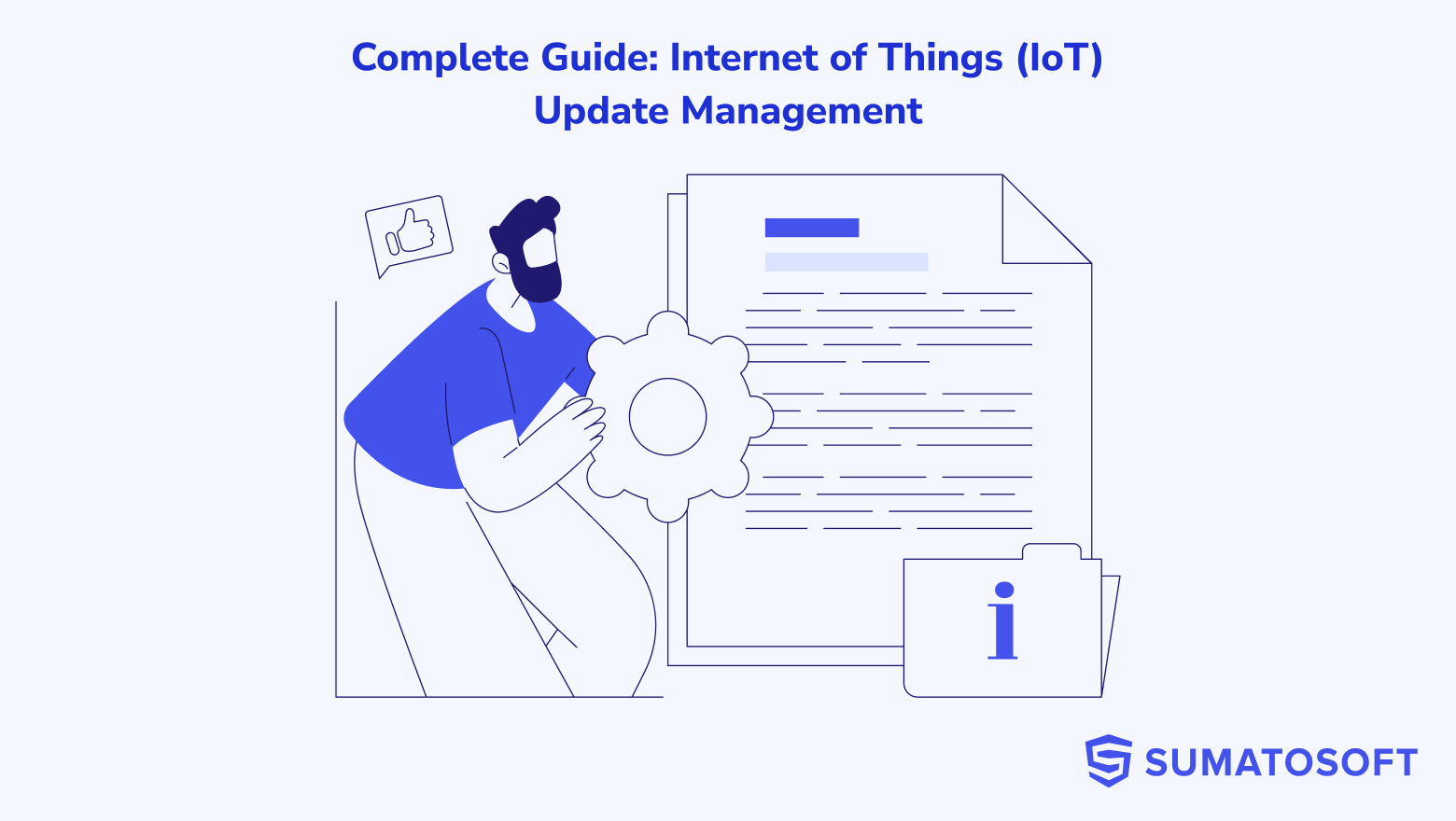Software Outsourcing Costs [2025 Updated] – Overview
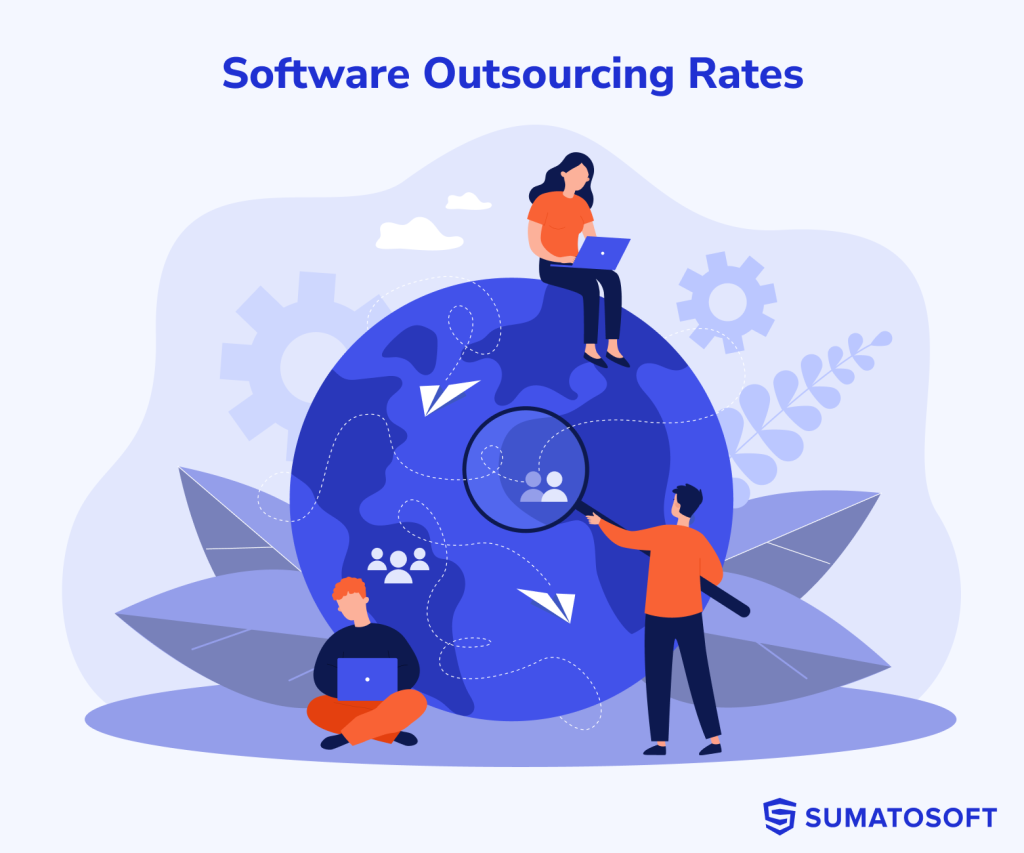
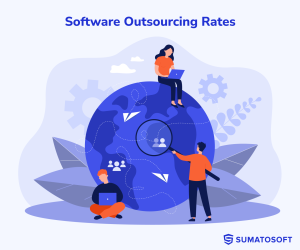
Outsourcing is a popular term nowadays, which means the practice of delegating some tasks to external companies or individuals. It’s popular because outsourcing allows access to talents worldwide without the need to hire them and pay all accompanying costs, including taxes.
In this article, I’m going to talk about the reasons why companies outsource and the factors that define the costs of outsourcing. I will also examine one specific region, India, in detail since it is quite a popular outsourcing destination.
Types of Outsourcing
Outsourcing is commonly divided into offshore, nearshore, or onshore outsourcing. The change of these terms depends on the company’s geographical position in the world.
Offshore means hiring an external organization in a different distant country, often on another continent. Nearshore means referring to the services of a company located in a neighboring country. And onshore means hiring an outsourcing company within the same country.
Choosing an outsourcing type is a strategic decision that is motivated by different business needs. Let’s clarify them:
| Type | Example | Pros | Cons |
|---|---|---|---|
| Offshore | The U.S.-based startup hires an outsourcing company in India for their mobile app development. | – significantly lower costs due to lower living expenses in the outsourced country; – access to a global talent pool; – operational scalability. | – huge time zone differences; – cultural and language barriers; – potential quality and compliance issues. |
| Nearshore | The same U.S.-based startup decides to refer to an outsourcing firm in Mexico. | – reduced costs compared to onshore, but higher compared to offshore; – relatively similar culture and language; – face-to-face meeting available; – similar time zones that facilitate communication. | – costs are higher than offshore; – limited options compared to the global talent pool. |
| Onshore | The U.S.-based startup finds an outsourcing company within the country. | – no language and cultural barriers; – real-time collaboration and communication during business hours; – easy legal compliance; – better control and oversight; – supports the local economy. | – highest cost due to higher local wages and operational costs; – limited talent pool compared to global options. |
Reasons Why Companies Outsource
The best way to understand the reasons for outsourcing is to analyze the existing outsourcing contracts and the benefits companies get from them. According to ISG, if we just calculate the worth of IT outsourcing contracts valued over $5m a year, we find around 3,000 contracts with a total cost of $270bn! That’s roughly equivalent to Finland’s annual GDP. Businesses highly value outsourcing, but why?
Deloitte conducted research in 2020 and found 5 primary reasons companies outsource their operations:
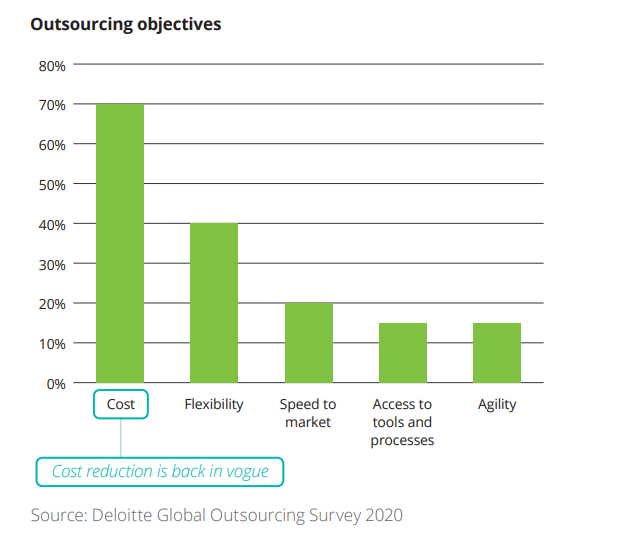
Cost optimization is in the lead. Other popular reasons for outsourcing are the availability of leading technologies and practices, the acceleration of time-to-market, and the expertise that high-quality development teams bring.
Factors That Define the Outsourcing Costs
We at SumatoSoft have developed over 250 projects, estimated over 1,000 projects, analyzed competitors’ costs multiple times, and referred to outsourcing ourselves! It was a long journey that shaped 3 key factors that define the software development hourly rate:
- location;
- expertise (skills, experience, seniority level, or whatever other synonym);
- project complexity.
There are, of course, other factors. But this trio determines 90% of the final project development costs. Let’s examine every factor in detail.
Factor #1: Location
The prices may drastically vary depending on the region because the cost of living varies in them, and this affects how much coders make an hour. Below is the list of popular software development outsourcing destinations:
| Region | Number of Companies, Clutch | Biggest IT Cities | Number of tech-focused universities |
|---|---|---|---|
| United States | 7,588 | San Francisco, New York, Seattle, Austin, Boston | ~250 |
| Europe | 8,490 | Berlin, Zurich, Vienna | ~500 |
| Eastern Europe | 4,532 | Warsaw, Prague, Kyiv, Sofia, Bucharest, Belgrade | ~100 |
| Asia | 9,329 | Ho Chi Minh City, Manila, Kuala Lumpur, Jakarta, Bandung, Singapore | ~600 |
| India | 5,960 | Ahmedabad, Bengaluru, Noida, Chennai | ~150 |
| Latin America | 2,463 | Bogotá, Montevideo, Buenos Aires, Monterrey, São Paulo | ~70 |
2025 Outsourcing Market Size By Country
| Region | Market Share, % |
|---|---|
| United States | 25.93% |
| Latin America | |
| Mexico | 3.99% |
| Brazil | 7.24% |
| Argentina | 5.31% |
| Europe (Beside Western Part) | 12.35% |
| Western Europe | |
| Poland | 7.02% |
| Ukraine | 6.00% |
| Romania | 5.06% |
| Bulgaria | 4.63% |
| Asia | |
| China | 4.49% |
| India | 10.18% |
| Philippines | 7.82% |
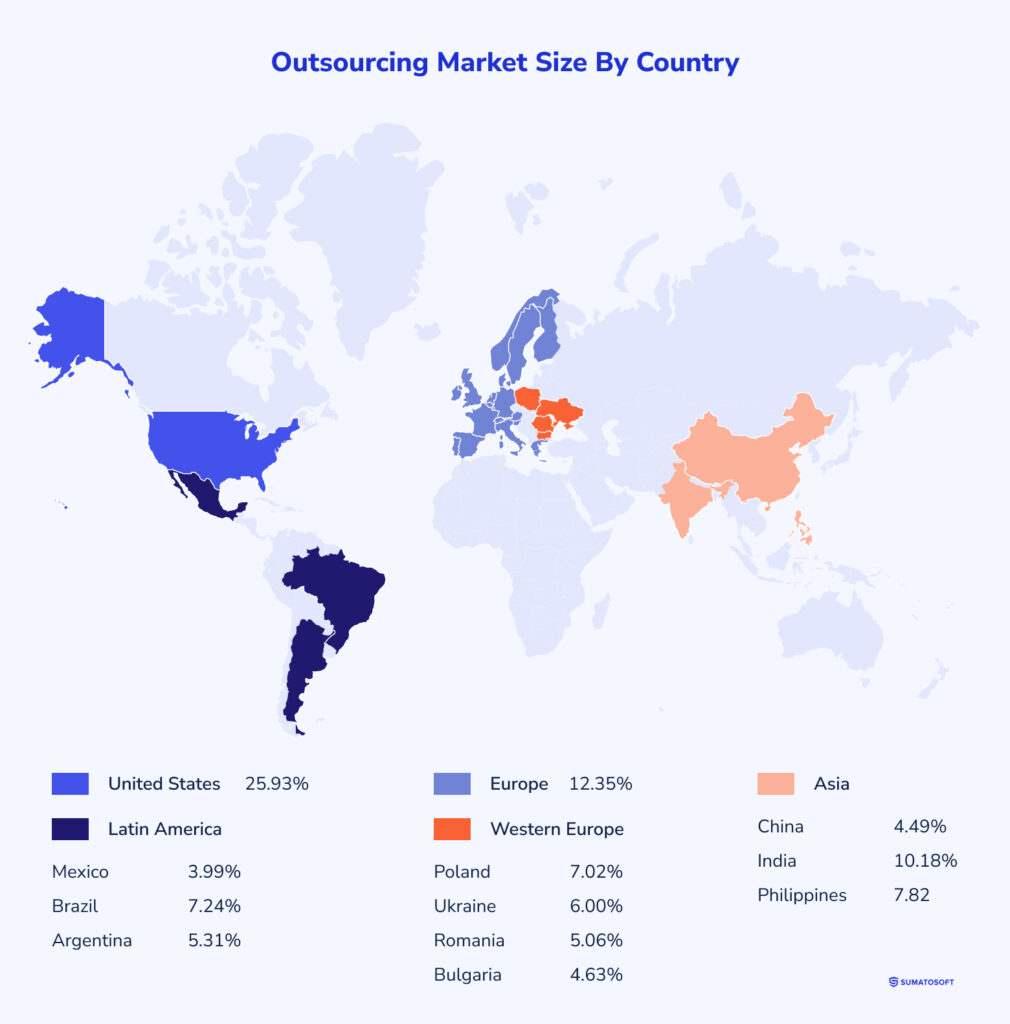
United States

The United States is a popular destination for companies seeking outsourcing. The reason is simple: US software development services typically come at a higher price than any other outsourcing destination due to labor and live costs. The average hourly rate in the US is $80-$110.
Even though this is the most expensive outsourcing region, the value provided in terms of expertise and quality often justifies the investments. Many talented engineers strive to relocate to the US due to its strong industry tech hub. Innovative huge companies like OpenA Microsoft, Amazon Web Services, Google, and Palo Alto Networks are based in the US. The opportunity to work for top companies attracts multiple talents from all over the globe.
The funny fact is that these tech giants themselves outsource parts of their operations to non-US-based companies.
Still, the US is a great place for outsourcing if the business has a huge budget and is looking for an onshore company.
Central, Western, and Northern Europe

There are two regions in Europe with different value propositions: Eastern Europe famous for its tech-savvy talent pool and cost-effectiveness, and the rest of Europe, which covers the Central, Western, and North parts that are famous for quality, advanced tech solutions. Here, I want to talk about the second part.
Central, Western, and Northern Europe covers numerous countries with unique outsourcing opportunities, so the correct approach here is to examine distinct regions. Still, these regions share several characteristics:
- High cost compared to the Eastern part. Hourly rate here could achieve the US level. The average software development hourly rate for IT services is close to $60-$80 per hour.
- Countries are known for their achievements in developing solutions with certain technologies or for specific industries.
- Excellent level of education.
So, let’s examine distinct countries:
- Germany is famous for its startup ecosystem, and it holds seventh place in the Global Startup Ecosystem Index. The major outsourcing city here is Berlin. Specialization lies in fintech, healthcare, and AI.
- Austria grew as a hub for healthcare and biotech innovation. Vienna has a well-developed infrastructure of cutting-edge research institutions and universities in these fields.
- France has a strong pool of highly skilled developers and researchers in fields like AI, machine learning, and cybersecurity.
- Northern Europe which includes Sweden, Finland, and Denmark, is responsible for clean tech and fintech. Strong government policies, robust educational systems, and significant investment in innovation are key characteristics of this area.
Eastern Europe
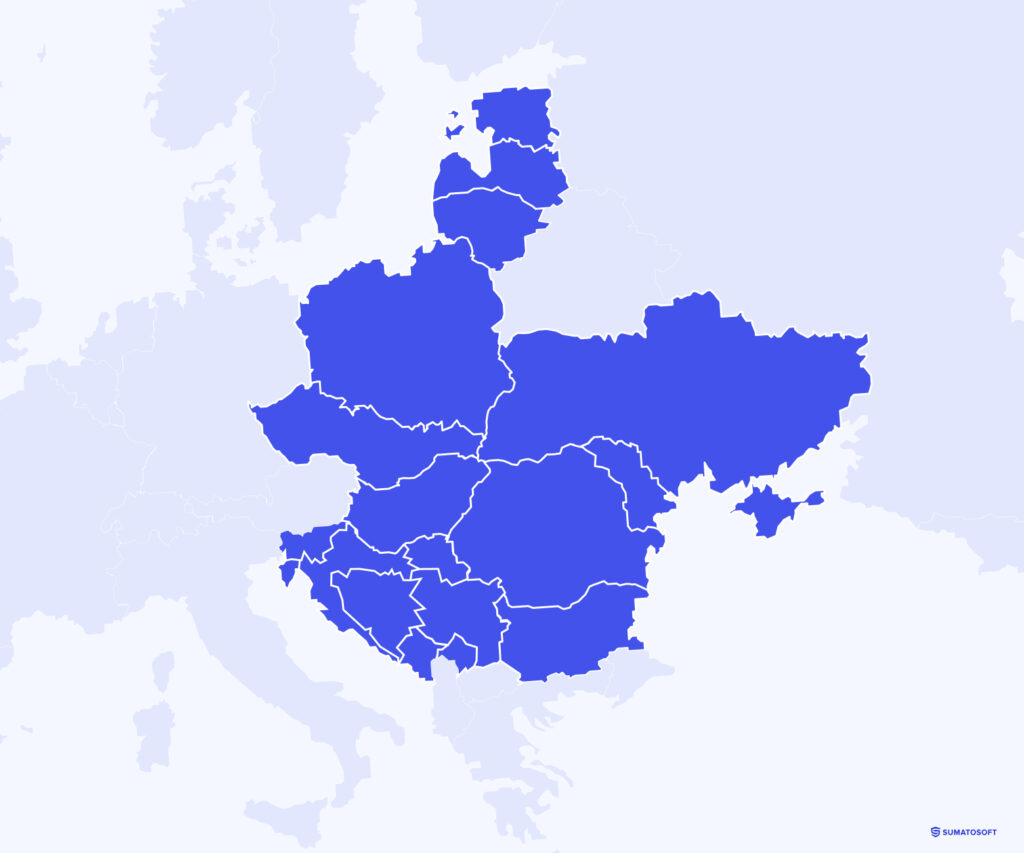
It is probably the most prominent outsourcing destination. It includes Poland, Ukraine, Romania, and Bulgaria. The Eastern Europe demonstrated the highest demand on the outsourcing market due to several factors:
- Cost-effectiveness – Eastern Europe is considered the region with the greatest quality for the price ration. The average software development hourly rate here is $40-60.
- Quality STEM education – the region produces many tech-savvy graduates every year, and their skills are among the highest on platforms for developers like LeetCode, HackerNoon, TopCoder, etc.
- Cultural proximity – Eastern Europe is known for cultural compatibility and language proficiency in English. In other words, it’s very convenient for US companies to cooperate with companies from this region.
Asian Region
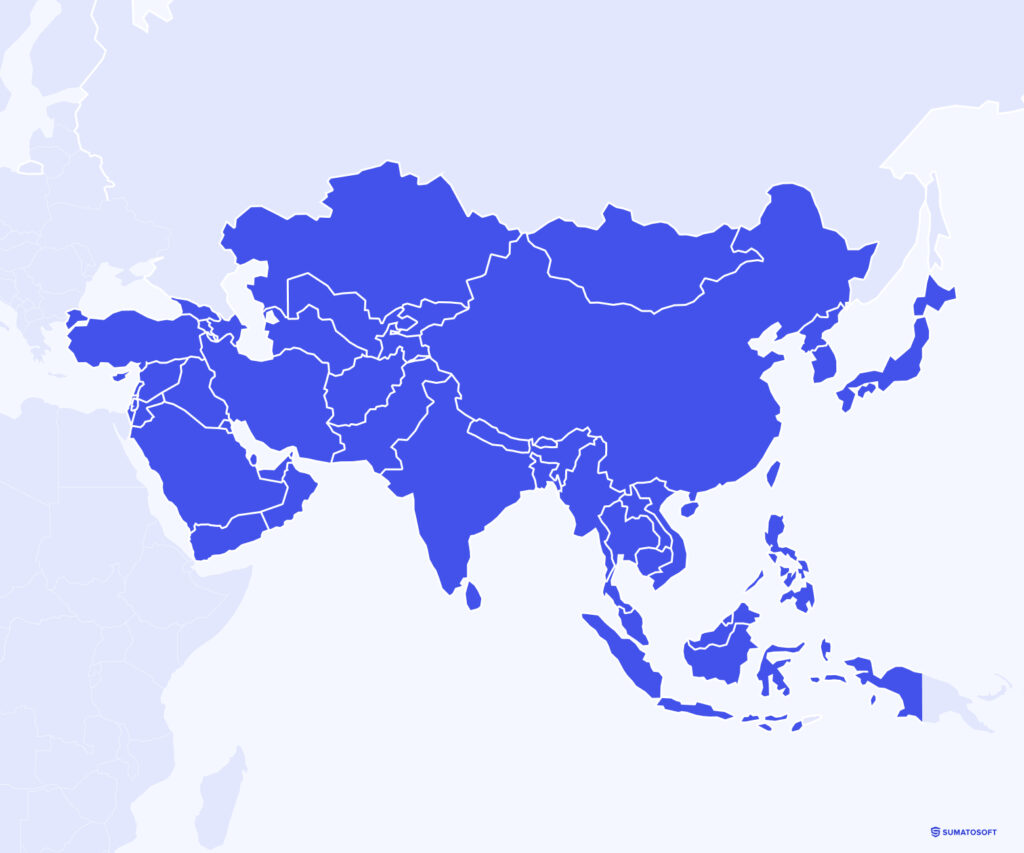
The Asian region includes multiple countries, the most famous of which is the Indian region, which we examine in detail separately. Other popular outsourcing destinations are the Philippines, China, Vietnam, Malaysia, Bangladesh, Thailand.
All Asian countries share the same set of characteristics:
- Low-cost – primarily famous for its most attractive hourly rates, which average range from $30 to $50 dollar per hour, and a huge number of offers with hourly rates around $20, which is almost impossible to find in other parts of the world.
- Broad service offerings – сompanies in this region rarely specialize in technology or the development of specific software. Businesses can ask for any possible type of software development. Every company in this region offers a broad range of services or has partners ready to fill the skill gap in case of a specific request, like developing a deep sea exploration robot.
- Growin infrastructure: The government actively supports the tech sector through tax incentives, IT parks, favorable business environments, etc.
India Region
This region gained traction recently because of the lowest software developer hourly rate and an extensive talent pool. This region’s average web developer hourly rate ranges from $6 to $11! Key characteristics of this area are:
- Vast talent pool – India has a population of almost 1.5 billion people with more than 150 tech-focused universities that graduate around 2.5 million engineers every year.
- Strong government support – the government created several tech hubs (Bangalore and Hyderabad) and supports them with benefits like lower taxes or Special Economic Zones with privileges.
- English proficiency – India is one of the largest English-speaking nations in the world. The EF English Proficiency Index (EPI) ranked India 52nd out of 111 countries, considered a high proficiency band.
Factor #2: Required Expertise
Expertise here refers to the set of skills, knowledge, and experience that the outsourcing team possesses. It varies depending on:
- programming languages (Python, Java, C#, etc.);
- expertise in working with some industry-specific software (Cerner for healthcare, Bloomberg terminal for Finance, etc.);
- the number of years of experience;
- knowledge of different legislative regulations;
- industry knowledge (like customer expectations, typical business processes, etc.);
- specialized knowledge (like blockchain, artificial intelligence, machine learning);
- certifications and qualifications (like AWS, ISO certifications, etc.).
The level of required expertise defines the software developer’s hourly rate and the total cost of outsourcing. The level of expertise also defined the efficiency and speed of the development and the quality of output. Here are examples of the annual cost and hourly rate of different specialists in the US outsourcing companies:
| Job position | Average salary in the US, $ | Hourly rate, $ |
|---|---|---|
| Big Data Scientist | $193,600 | $ 93.07 |
| Backend Engineer | $212,000 | $ 102.30 |
| Machine Learning Engineer | $212,000 | $ 102.30 |
| Android/iOS Developer | $197,000 | $ 94.61 |
| Embedded Systems Engineer | $200,000 | $ 96.15 |
| Cloud Computer Engineer | $245,000 | $ 117.69 |
| Game Developer | $127,000 | $ 60.77 |
| QA Engineer | $131,000 | $ 63.07 |
Factor #3: Project Scope and Complexity
Project scope, in simple words, comprises all the work necessary to develop the project.
In more formal terms, the project scope is a set of features a project must have to be released. It includes the development of functionalities, user interface design, integrations with other systems, data migrations, etc.
Project complexity, in turn, is an abstract estimation of the various aspects like technology, budget, desired timeline, regular compliance, etc. that make the project challenging to execute and deliver.
How do we estimate their influence on the final cost?
Well, lots of software development companies developed their price calculators to help preliminary estimate the development cost. Still, the correlation between the project cost and complexity here is simple, the development cost will be higher when:
- it needs advanced technologies like machine learning;
- it has multiple roles;
- there are numerous use roles;
- it requires integration with lots of third-party providers;
- etc.
The project scope and complexity affect not only one but four cost types:
- development costs;
- testing costs;
- maintenance and scalability costs;
- user training and support costs.
Now, let’s refer to numbers.
Outsourcing Software Development Hourly Rates Comparison by Regions
| Region | Hourly Rate Range, $ |
|---|---|
| North America | $71 – $95 |
| Central Europe | $42 – $74 |
| EasternEurope | $27 – $51 |
| South Asia | $22 – $44 |
| Southeast Asia | $24 – $35 |
| India | $6 – $12 |
| Latin America | $35 – $60 |
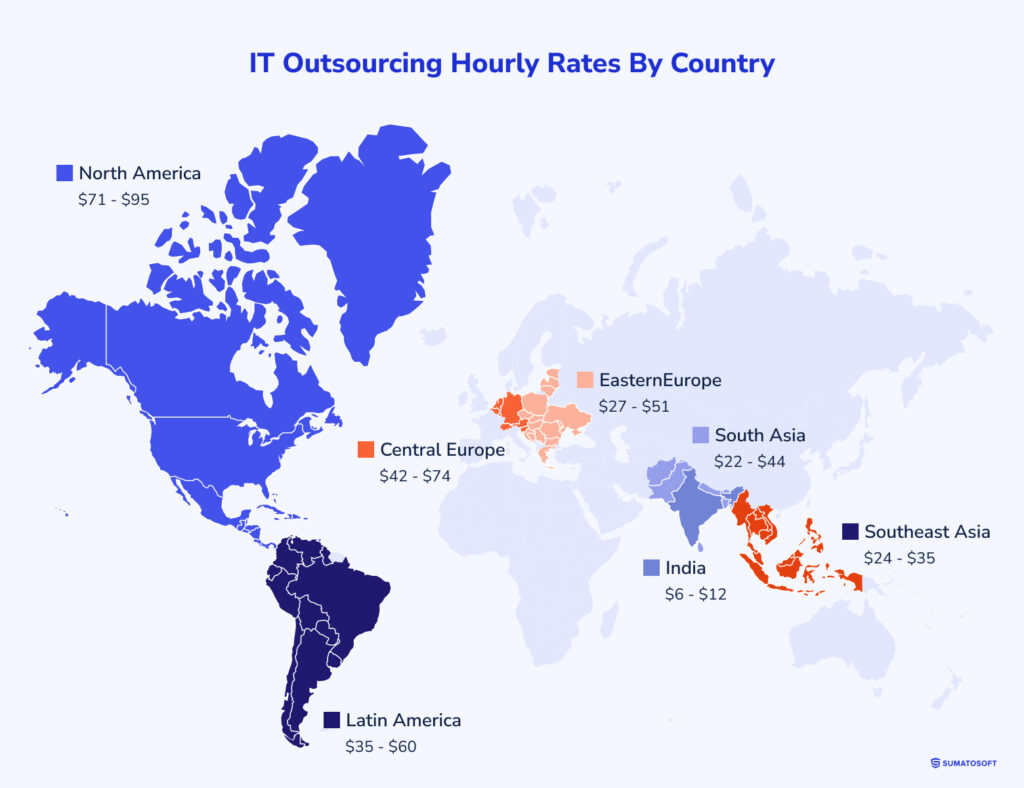
IT Outsourcing Rates 2025 by Job Position in Different Regions
This chart shows the overall prices for the 2025 year:
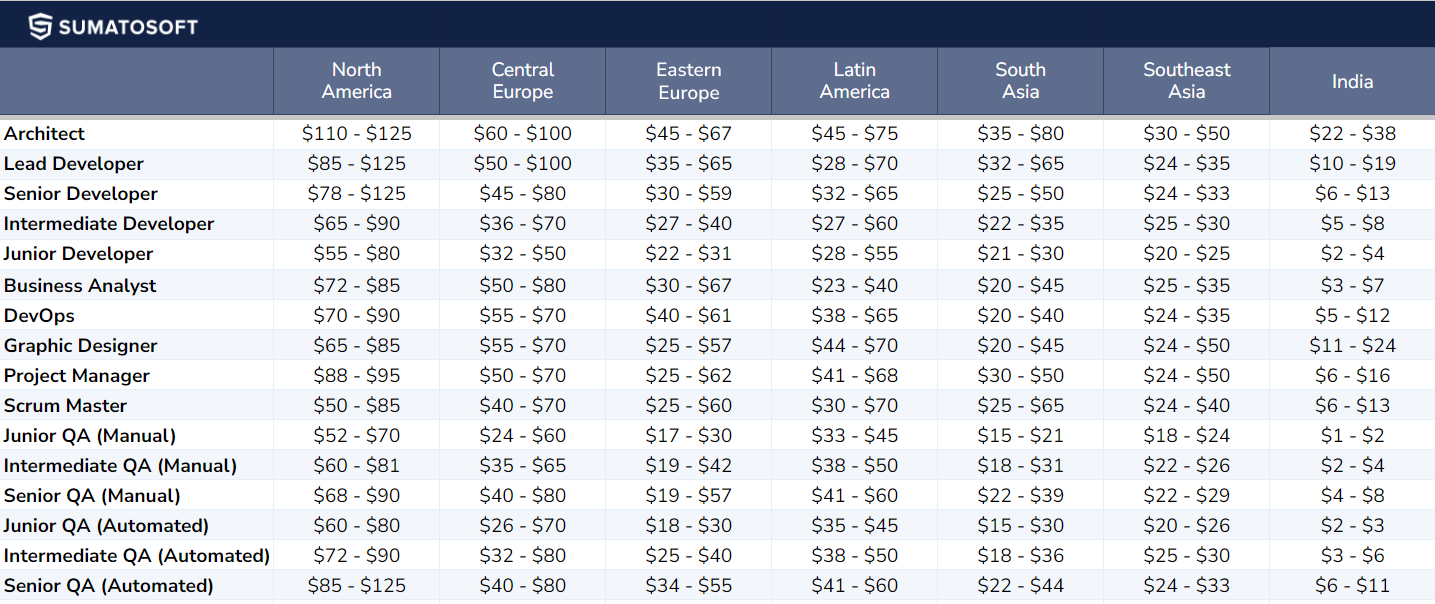
How to Optimize the Costs
Here, I want to share methods to optimize software development costs. These methods allow to avoid spending resources on unnecessary activities and preventing the project budget and scope expansion.
# 1 Set Clear Project Objectives
Clear objectives from the start highlight top business priorities, allowing the team to adapt their approach to meet these objectives.
For example, when final deadlines are strict, the development team focuses on delivering quickly, developing critical functions early, ensuring a fast decision-making process.
If the budget is a critical factor, the team choose the technology in accordance, optimizing for open-source or lower-cost tools. The focus lies on the core features, and project managers use different techniques to keep the development within the budget.
The same approach is applied to other goals like scalability, product customization opportunities, compliance and security, customer satisfaction and retention, etc.
#2 Outsource to Cost-Effective regions
Consider outsourcing to reputable regions like Eastern Europe, where the software development quality remains high while labor costs are significantly lower.
If range the regions by cost-effectiveness from the highest, the list will look like this:
- Eastern Europe
- Latin America
- Indian Region
- Asian Region
- United States
- Central, Wester, and Northern Europe
#3 Ensure Regular Meetings and Demos
Insisting on regular meetings and work demos keeps the project on track and aligns the development team’s progress with your expectations. Close communication helps prevent costly deviations in both budget and timeline. These checkpoints provide opportunities to address potential issues early, adjust priorities, and ensure everyone is on the same page.
#4 Meticulously Review Development Artifacts
Artifacts like wireframes, prototypes, moodboards, and others are tangible results of the developer’s efforts.
Every artifact lays the foundation for the subsequent development step, meaning that an artifact that doesn’t fully meet business needs and requirements will lead to the development of an incorrect artifact in the next step.
That’s why meticulously reviewing every artifact greatly contributes to the product’s success. Early business feedback allows necessary adjustments to be made before they evolve into larger issues. For example, we at SumatoSoft communicate weekly, run demos of the work done, provide several contact points, send timesheet reports every month, explain potential risks and help handle them, advise on decisions, and help avoid unnecessary costs.
#5 Adjust Testing Efforts
Not all projects require the same level of testing. There are multiple testing types: usability, unit, integration, functional, regression, smoke, sanity, performance, load, and more.
There is also the term test coverage, which is a metric used to measure the extent to which the source code should be tested. This percentage and types of necessary testing are agreed upon with you in the quality assurance strategy that defines future testing efforts. Still, we have one quality criterion that we use for all our projects: that tested software should come without critical bugs and blockers that prevent the main scenarios from completeness.
It’s possible to optimize costs by altering the testing efforts in the project.
Outsourcing to SumatoSoft Development Company
SumatoSoft is a reliable outsourcing software company. We work with all outsourcing types and engagement models.
Speaking about staff augmentation, we have a ready-to-go and custom-hired team of software engineers, Scrum Masters, Designers, and QA specialists ready to extend any team’s capacity.
When it comes to full-cycle custom software development, every project we undertake starts with nuanced business analysis. We have over 250 successful projects in various industries, such as eCommerce software, e-learning development, Financial software development, healthcare software development, Real Estate, Logistics software, Travel, and more.
SumatoSoft is great in every regard including costs, professionalism, transparency, and willingness to guide. I think they were great advisors early on when we weren’t ready with a fully fleshed idea that could go to market. They know the business and startup scene as well globally.
They did a great job hitting cost estimates and are a bargain for quality. They also helped our business concept greatly. We are confident in our plan and future in the hands of SumatoSoft.
Regarding mobile app development, 70% of our team are senior-level developers with a vast background in designing and developing IoS applications as well as Android development for smartphones, tablets, and wearable devices.
- 12 years on the market of software development.
- We work honestly and openly for fair rates.
- No communication barrier since all specialists speak English well.
- 250 custom software solutions.
- 27 countries we worked with.
The SumatoSoft team has built 250 custom software solutions for 27 countries for the last 12 years. Clients are satisfied with our results. 4.8 rating on Clutch and 5.0 rating on Goodfirms prove it. Get in touch!
Afterwords
With this information in mind, businesses can make an informed decision on how to outsource cost-effectively. Cost-effectively here doesn’t mean cheap. It means referring to the regions where hourly costs fit the project budget rather than trying to outsource a startup development with limited family and friends funding to a US company where the minimum project size starts from $100,000.
Let’s start
If you have any questions, email us info@sumatosoft.com



